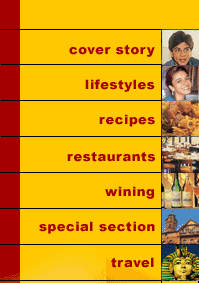
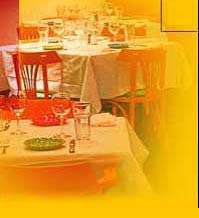

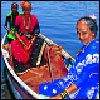 Catch Of The Day!
Catch Of The Day!The Koli fishing community of Bombay are the city�s oldest residents. They live in simple, old-fashioned comfort in fishing villages along Bombay's vast coastline. The catch of the day that comes into their trawlers' nets does not always make it to the fish markets. Some of it is converted into delicious Koli cuisine in their homes, UpperCrust reports. |
|
KASHIBAI CHACHUD, one of the oldest residents of the Khar-Danda fishing village in suburban Bombay, starts her preparations for lunch every afternoon when from her kitchen window she spots her fishing trawler slowly chug-chugging its way towards a stone and wooden jetty in the village. This is one of the oldest fishing villages in Bombay. It is right on the city�s western coastline, and during high tide, the waves of the Arabian Sea come over the rocks right upto Kashibai�s back door. The arrival of the trawler every afternoon means that fresh seafood will soon be delivered at her door to go into the cooking pots for lunch.
�If this is not the catch of the day, then what is,� she grins through tobacco-stained black and broken teeth. �Most of the catch goes to the fish markets of Khar-Danda, Citylight, Dadar and Crawford Market, but some of it, I salvage for home.� Fair enough, because the Koli fisherfolk spend an entire day and night out at sea catching fish to fuel the city�s seafood needs; and if they cannot keep the choicest that come into their nets for home, they may as well be engaged doing something else.
The Kolis are the original inhabitants of Bombay, they have been here even before the time Vasco da Gama came sailing in his dhow in 1497 to claim the seven islands of Bombay for his Portugal king from the Sultans of Gujarat. And they witnessed in 1661 the King of Portugal bequeathing these seven islands as dowry in a politically-correct marriage between his daughter Princess Catherine de Braganza and the British Prince Charles II. The Khar-Danda fishing village is probably that old. Civilisation has taken its time getting here. The houses are all in a small cluster, as if huddled together to keep the cold westerly sea breezes from blowing them away.
When the tide is low, the three Koli sisters walk over the treacherous rocks to where a small picturesque temple stands under a shamiana. It is the temple of the Goddess Harbai Mauli, she being the deity of the seas. There is another temple in the Khar-Danda fishing village, a Ram mandir, near where the fishing trawlers are hauled out of the sea and dry-docked for the monsoon. But it is the Goddess Harbai Mauli that the fisherfolk worship each time they set out to sea. They offer puja and break coconuts in appeasement, asking the goddess to look after them and their trawlers. Like the fisherman�s prayer, �Lord, thy oceans are so vast and my boat so small!�
Koli cuisine is simply made. After the seafood is selected, it is lightly fried in peanut oil and given a tadka of tomato and onion. The main spice that the Kolis use is their own kala masala, made of black pepper, cloves, cinnamon, black cardamom, poppy seeds, black sesame seeds and red chilli powder. They use a lot of kopra in their food as well. And if there is to be a variation to the tangy and spicy seafood curries, the Kolis add drumsticks, lady�s fingers, brinjals and potatoes to the food. It is rare that they cook vegetables separately, but when they do, the Kolis favour red pumpkin, kidney beans, snake gourd. And they make a dry bhakri, a bread out of coarse rice flour, to go with their food.
The monsoon months are also the time when the Kolis settle down to repairing their trawlers and mending their fishing nets. For four whole months, there is no fishing. It�s not that they fear going out to fish in the turbulent seas. Monsoon is the breeding season for fish, and it is the unwritten law of the community, that the fish should be allowed to breed in peace. �The seas are bountiful rest of the year, we get enough to feed the city, and for ourselves,� says Kashibai.
|
|
|

Home Page
About the mag
Subscribe
Advertise
Contact Us
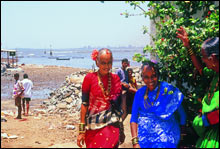 Their fishing trawlers sail far and wide, daringly riding the waves to fish in the rich and bountiful waters of Goa, Palghar, Satpute, Uttan and Bombay. From where they catch mussels, clams, lobsters, crabs, prawns, and the pomfret, rawas, surmai, bangda. At the jetty itself, the sorting out is done, Kashibai and her sisters Devubai Chachar and Janibai Chawri, all in the fishing business, decide what goes to the markets and what they take back home. Half and hour later, the sisters sit down happily to their lunch.
Their fishing trawlers sail far and wide, daringly riding the waves to fish in the rich and bountiful waters of Goa, Palghar, Satpute, Uttan and Bombay. From where they catch mussels, clams, lobsters, crabs, prawns, and the pomfret, rawas, surmai, bangda. At the jetty itself, the sorting out is done, Kashibai and her sisters Devubai Chachar and Janibai Chawri, all in the fishing business, decide what goes to the markets and what they take back home. Half and hour later, the sisters sit down happily to their lunch.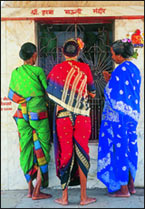 At lunch time, the narrow non-motorable lanes of the village are empty except for barking dogs and an idl-sambar seller honking on a bicycle to announce his arrival. The village is neat and tidy, even though open gutters connected to each home flow alongside the lanes, taking dirty water out to the sea. The houses are of simple architecture. Four walls with wooden carved doors and ladders running up to the first floors. Most of the windows open onto a view of the sea where fishing trawlers bob about like corks in a bath-tub, their flags fluttering in the breeze. The village is in the flight path, so there is the familiar drone of aircraft passing overhead all the time, and the occasional clatter of a chopper flying low to oil rigs out at sea.
At lunch time, the narrow non-motorable lanes of the village are empty except for barking dogs and an idl-sambar seller honking on a bicycle to announce his arrival. The village is neat and tidy, even though open gutters connected to each home flow alongside the lanes, taking dirty water out to the sea. The houses are of simple architecture. Four walls with wooden carved doors and ladders running up to the first floors. Most of the windows open onto a view of the sea where fishing trawlers bob about like corks in a bath-tub, their flags fluttering in the breeze. The village is in the flight path, so there is the familiar drone of aircraft passing overhead all the time, and the occasional clatter of a chopper flying low to oil rigs out at sea.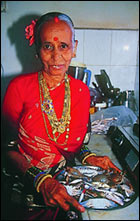 Naturally, then, the arrival of the trawlers in the afternoon is good news to the Kolis staying in the Khar-Danda fishing village. Not only does it mean that the Koli menfolk have returned home from the seas safe and sound, but it also means that the seafood has arrived. If you are invited to lunch at a Koli home, accept blindly. The Kolis, like the sisters Kashibai, Devubai and Janibai, will make you feel at home, they will press cold and sweet sherbets onto you to drink. Or if you are so inclined, they will offer you their home-made liquor, a darkish brew made out of the jambul fruit, and switch on the radio to keep you company while they hurry up the lunch in the kitchen.
Naturally, then, the arrival of the trawlers in the afternoon is good news to the Kolis staying in the Khar-Danda fishing village. Not only does it mean that the Koli menfolk have returned home from the seas safe and sound, but it also means that the seafood has arrived. If you are invited to lunch at a Koli home, accept blindly. The Kolis, like the sisters Kashibai, Devubai and Janibai, will make you feel at home, they will press cold and sweet sherbets onto you to drink. Or if you are so inclined, they will offer you their home-made liquor, a darkish brew made out of the jambul fruit, and switch on the radio to keep you company while they hurry up the lunch in the kitchen.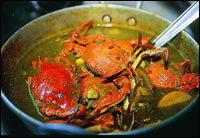 Mutton and chicken are a delicacy for the Koli community. It�s not that they do not consume these meats, they do, but only on Sundays and special occasions. Instead of which, they prefer to alternate their diet with dry fish. During the summer months, they salt and dry Bombay Duck, shrimp, and other fish, which is then stored in cool and dry places in their larders at home. During the long monsoon months, when there is no fishing, the Kolis sparingly take out their dry fish and lightly fry it in a little oil, they add onion, tomato, chilli powder, and voila, a seafood meal is instantly ready!
Mutton and chicken are a delicacy for the Koli community. It�s not that they do not consume these meats, they do, but only on Sundays and special occasions. Instead of which, they prefer to alternate their diet with dry fish. During the summer months, they salt and dry Bombay Duck, shrimp, and other fish, which is then stored in cool and dry places in their larders at home. During the long monsoon months, when there is no fishing, the Kolis sparingly take out their dry fish and lightly fry it in a little oil, they add onion, tomato, chilli powder, and voila, a seafood meal is instantly ready!